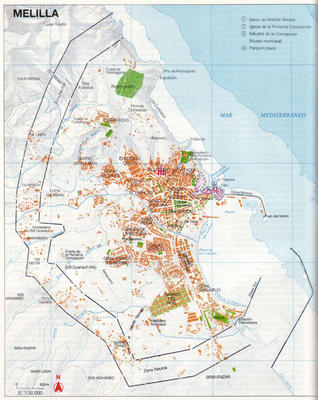more about Melilla, Spain's enclave in Morocco
 Melilla, a Spanish possession on the Mediterranean coast surrounded by Morocco. The Zona Neutral's razor wire barriers are proving insufficient to keep African migrants, driven by economic pressures, out of Melilla.
Melilla, a Spanish possession on the Mediterranean coast surrounded by Morocco. The Zona Neutral's razor wire barriers are proving insufficient to keep African migrants, driven by economic pressures, out of Melilla.(Click on image for larger and more detailed.)
Reuters
Saturday 8 October 2005
Spaniards turn edgy
on African enclave
By Emma Ross-Thomas
MELILLA, Spain (Reuters) -- It's Ramadan in Spain's North African enclave of Melilla and as tempers fray, a group of shopkeepers argue about how Spanish they are.
"I am a Spanish Berber," one fasting shopkeeper shouts in Spanish, repeating it in the Berber language Tamazight.
Mimon Mohamed Amar shouts back: "Come on, all of us Muslims have family in Morocco ... we all migrated from Morocco."
Melilla, nestling on Morocco's northeast coast, has been Spanish since the late 15th century but Morocco claims it, along with Spain's other enclave of Ceuta.
Insecurities about Melilla's status as a Spanish city or colony -- never far from the surface -- have re-emerged in recent weeks amid an immigration crisis in the city and residents in both enclaves held pro-Spanish demonstrations last week.
"The Melillans will fight however we can so that it is not surrendered," said 56-year-old health worker Maria Dolores Gongora.
The hundreds of African migrants who have tried to enter Europe by storming the enclave's heavily guarded razor-wire border have a limited impact on the city as they are regularly flown to the mainland but the crisis has sparked tensions between Melilla and Madrid and between the enclave and Morocco.
Several local and national newspapers have suggested Morocco was turning a blind eye to African migrants crossing the razor-wire border fence in order to put pressure on Spain to ditch the enclaves -- Europe's only land borders with Africa.
"Our southern neighbor is using these thousands of desperate people as a tool ... so that we do not forget that they want Ceuta and Melilla for themselves," an editorial in a Melilla newspaper said.
A piece in a nationalist Moroccan newspaper fueled that by saying Spain could rid itself of the immigration problem by leaving the continent.
Morocco has since reinforced police and military units around the enclaves, arresting hundreds of migrants. Moroccan troops killed six Africans who were trying to get into Melilla last Wednesday.
Some Melilla residents -- a large proportion of whom have relatives in the army or civil guard police -- said they felt abandoned by the Socialist central government which was not doing enough to stop the migrants clambering over the fences.
They also felt Prime Minister Jose Luis Rodriguez Zapatero did not feel strongly enough about keeping Melilla Spanish.
"The new (Socialists) I think aren't very keen. They make a lot of agreements with the Moroccans, they talk a lot with the Moroccans," said a 46-year-old civil servant who gave his name only as Antonio.
Melillans were angered by press reports Zapatero failed to answer a question on Melilla's sovereignty at a news conference with his Moroccan counterpart and he was forced last week to state his commitment to the territory staying Spanish.
The city is home to Muslims, Christians, Jews and Hindus who are broadly united in wanting the city to be Spanish.
Like Britain's colony Gibraltar off Spain's southern coast, the enclave is much richer than the surrounding area. It is full of civil servants who earn more than their mainland counterparts. Melilla enjoys low taxes and swathes of the population live off border trade.
"I don't want Morocco to take over Ceuta and Melilla, it would mean ruin," Mohamed Dris, a 70-year-old shopkeeper, said. "Ceuta and Melilla are Morocco's, of course they are, but Spain has taken them and I don't want Morocco to ruin everything."
Many of the Muslims in Melilla, like the shopkeeper who declined to give his name, are Berbers, a group traditionally repressed in Morocco and therefore less keen on Moroccan rule.
"This is Spain, whoever wants it to be Moroccan can go off to Morocco," said the shopkeeper, who sells Moroccan gifts, clothes and ornaments.
MULTICULTURAL MODEL?
Just over half the residents are of Christian descent but the Muslim community is growing faster. Of the 90 births in the city in July, 63 were to families with Muslim surnames, a National Statistics Institute official said.
Residents say Melilla -- where veiled women are a common sight and minarets dot the skyline amid the traditional Spanish architecture -- is a model of tolerant multi-culturalism.
"We get on famously. We have Jewish friends and we have dinner with them and Muslim friends who have parties we all go to," Gongora said.
Some Muslim residents are less sure of the Christians' tolerance and residents of Spanish descent, while denying accusations they are racist to their Muslim neighbours, feel uneasy about becoming the minority.
Antonio Sanchez says that when that happens, the Christians will abandon Melilla.
"We will have to leave here ... the mayor will be Moorish, the councillors will be Moorish, this will be Moorish."
(Additional reporting by Souhail Karam)
© Reuters 2005. All rights reserved.


0 Comments:
Post a Comment
<< Home